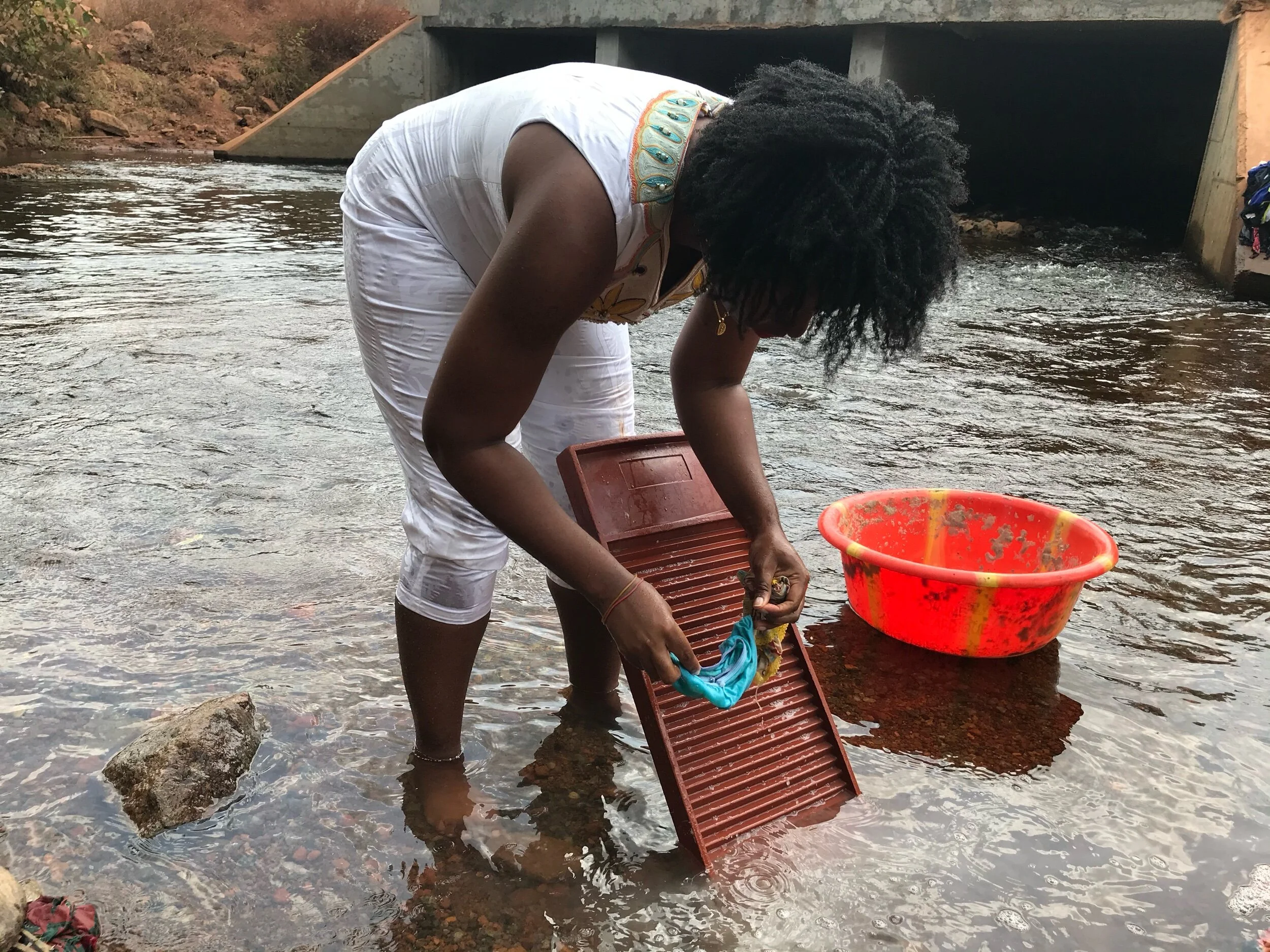3 Things You Need to Know About Sierra Leone: Leadership, Common Sense, Office Toilets
In Moyamba filming for the Vickie Remoe Show, children on the side of the road at a stream washed their laundry. I joined them.
Leadership, common sense and clean office toilets are all scarce in Sierra Leone. I want to tell you a story about my office toilet in Freetown and what it taught me about Sierra Leoneans.
Eighteen months ago, I began renovations on what is now our office. One of the most contentious issues I had with the builder was how many toilets we would fit. He said, as the boss, I should not share a toilet with staff.
Why does the boss not share a toilet, I asked? He said that staff would never be able to keep the toilet clean. He said that everyone in Sierra Leone knows this.
It's not that I didn't know this was the norm. I know that the toilets in Sierra Leone's offices are disaster zones. The problem is that most public and private offices don't have enough staff members with the common sense needed to keep an office bathroom clean.
So what bosses in Sierra Leone do is create an alternate experience for themselves. They decide that the best way to handle the potty is never to enter the staff toilet. Most people work in offices where they never use the toilet.
My builder and I argued for a week, but I explained my one toilet rule policy to him like this: if we can't as a team work together to keep our toilet clean, then we shouldn't have an office.
With that announcement, I knew I was committing to starting and maintaining a culture that would be foreign to my staff. Clean toilets are foreign for most people, and I don't say this to be condescending. It is a fact. Only 16% of us have a toilet that we don't share with another household. Shared toilets are mostly communal latrines, and some 18% of Sierra Leoneans openly defecate (why our country is a hotspot for cholera).
Those with shared toilets at home outnumber those who have modern or improved non-shared toilets among office workers. However, in most offices, the bosses behave like everyone has the common sense to use and keep a modern toilet properly clean.
A b3g mek wi tok tru. Dis don como pan shem.
The fact is people do not even know where to put their feet when they sit on the toilet. It is not common sense if you've never seen or used one.
When I made our one toilet rule, I was aware that I was signing up to share a bathroom with people who may not have had the same toilet privileges. I wanted them to know and have the toilet experience that I had grown accustomed to after leaving Sierra Leone as a child.
To make the toilet paradigm shift for my team, first I set the rules:
No one should use a dirty toilet.
If you find the toilet dirty, you're not allowed to use it unless you're going to clean it.
When you meet a dirty toilet, you should report it to the team.
Everyone has to stop work to find out who left the toilet dirty.
There should never be fewer than four pieces of toilet paper in the loo.
If there is no water to wash bums, flush the toilet, or wash hands, do not use it
There should never be less than two bottles of hand wash.
Anyone who meets these rules broken should report it.
Everyone who uses something that brings it below our approved stock level must replace it from the office supplies.
Everyone was shown where we keep supplies.
And finally, we created a budget for toilet supplies and allocated resources to it monthly
It hasn't been plain sailing. In one instance, the toilet was dirty, and someone wanted to use it, but the person who had left it dirty had gone out. So we all waited until they came back.
When they arrived, we had a staff meeting. I informed that person that they had deprived the entire office of the toilet. They expressed remorse. They went in and cleaned it. The next time it was left dirty by another team member, the same thing happened. We waited.
Once, I went into the company toilet after everyone had gone home and took a picture of what I found. Someone had not replaced the toilet roll. I asked whoever had left it that way to come forward and take responsibility. They did, and they apologized to the team. I put that person in charge of checking paper and soap levels at the end of every day - this is in addition to the manager, whose job is to buy the stock when it's running low. We also have a cleaner who cleans the toilet every morning.
If you don't meet your people where they are and lead them, you can forget about growth and change. Bosses must become leaders who set the standard. And every boss has to lead by example to uphold these standards. It goes for all bosses - in hospitals and schools, in the public sector, and in businesses.
In 18 months of running an office in Freetown, our toilet is my pride and joy, not the videos, blogs, and press we do for clients. When strangers visit our office, I don't have to do a pre-check to see if the toilet is clean. I know it is. It didn't happen overnight, but our company culture is that our toilet should be clean.
Beyond toilets, imagine (because it is so) that people lack the knowledge to have what we expect to be 'common sense': "sound judgment derived from experience rather than study" for every aspect of life in Sierra Leone. Educated folks lack common sense as much as those who are uneducated. (No shade but have you seen the toilets at Fourah Bay College, the University of Sierra Leone?).
The vast majority of Sierra Leoneans do not have common sense - because they lack the learned experience. Those in positions of power either pretend they don't know this or expect to impart common sense by command. The combined impact of war, poverty, and the way subsequent governments have embraced mediocrity as a way of life are what have brought us here.
You don't have to go far to see the lack of common sense (Krio go say tact). Every day parents opt to put their children on okadas without helmets. Teachers collect bribes to pass students. If you're in a car and the driver is speeding, and you tell them to slow down, he'll ask you to come down. A man walks into the compound of a private home and pisses in front of the house. He says the community passed a law against pissing on the street, so he thought someone else's front door would be ideal to pee. When government officials and their families procure goods and services with taxpayers' money, they ensure that they double and triple pay for everything. These are the educated folk.
If experience is how you get common sense, then what do you do if the environment systematically conditions you to act in poor judgment? How do we give our people the common sense they need to meet the challenge of self-improvement, discipline, and our national values?
Sierra Leone will not leapfrog without common sense, even if we educate the whole nation. We can dress our country and its problems with scorecards and self congratulate on moving from -1 to 0, but move we shall not because Sierra Leoneans, and a vast majority of us, lack common sense.
Where to start? Acknowledge that most adults grew up in poverty and during the war. People who grow up making life and death decisions about food and safety have grown up with survival mode as their norm: no long term plan, no tomorrow, no thought about the consequences.
Many of the things elites (the bosses) in Sierra Leone take for granted they learned by experience. That you can Google to search and find information online is not common sense. That you should hold your trash until you find a bin is not common sense. Calculating the optimal route to a destination to arrive well before the event starts is not common sense. If we expect our people to learn how to make sound judgment, the bosses must commit to lead and plan to uphold new standards—otherwise, it's all just hot air--boku tok.
Our generation will not be led by fancy jargon or by gbagbagti. The bosses must lead by example and not hideaway behind honorifics and boss man privilege. People must see and learn common sense by watching those who have it.
Clean office toilets for all…pass it on.







